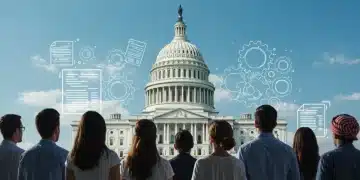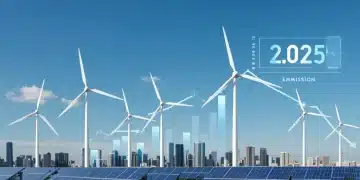House hearings on climate change policies to begin

House hearings on climate change policies aim to address pressing environmental issues by engaging key stakeholders for actionable solutions that can reshape legislation and encourage community involvement.
House hearings on climate change policies to begin, drawing attention to vital discussions that could shape our environmental future. Have you thought about how these hearings might influence your community? Let’s dive into the details!
Overview of current climate change policies
Understanding the current climate change policies is crucial for grasping how governments address environmental issues. These policies play a vital role in shaping our response to climate change.
Many nations have committed to reducing greenhouse gas emissions through international agreements, such as the Paris Agreement. These regulations encourage countries to set ambitious targets for emission reductions and develop strategies to meet those goals.
Key Components of Climate Change Policies
Policies often include various components designed to address different aspects of climate change.
- Renewable Energy Investment: Governments are encouraging the shift from fossil fuels to renewable energy sources like solar and wind.
- Emission Standards: These standards limit the amount of greenhouse gases that businesses can emit.
- Tax Incentives: Tax breaks and incentives are provided to companies that invest in green technologies.
- Public Awareness Campaigns: Educating citizens about climate change and its effects helps promote responsible behavior.
A significant aspect of these policies is the need for cooperation among different sectors of society. By uniting government, businesses, and the public, we can create a more sustainable future.
Moreover, adaptation strategies are becoming increasingly important. These strategies aim to prepare regions for unavoidable climate impacts, such as rising sea levels and extreme weather events. Implementing adaptation strategies can minimize damage and protect vulnerable communities.
As we dive deeper into these policies, it’s essential to recognize that they are continually evolving. Policymakers assess new scientific data and adjust strategies as necessary to combat climate change effectively.
Key players in the hearings

The key players in the hearings on climate change policies are crucial to understanding the dynamics at play. These individuals and groups bring diverse perspectives and expertise to the discussions, impacting the outcome of potential legislation.
Among the essential participants are government officials, environmental advocates, and representatives from various industries. Each group plays a distinct role in shaping the conversation and influencing policy decisions.
Government Officials
Government officials, including lawmakers and regulators, are at the forefront of these hearings. They are responsible for drafting, debating, and voting on climate-related legislation. It’s important for them to listen to the concerns of their constituents and consider the long-term effects of their decisions.
In addition to lawmakers, experts from government agencies assess scientific data and provide recommendations. Their insights help ensure that proposed policies are grounded in research and practical strategies.
Environmental Advocates
Environmental advocates are vocal representatives for the planet’s wellbeing. They often present findings on the impacts of climate change and highlight the urgency of implementing effective policies. These advocates mobilize public support, drawing attention to critical issues.
- Grassroots Organizations: Local groups often engage community members in advocacy efforts, urging lawmakers to take action.
- National Environmental Groups: Larger organizations aim to shape federal policies and may conduct research to inform their proposals.
- Scientists and Researchers: They provide data that reinforces the importance of addressing climate change.
The clash of opinions between industry leaders and environmental advocates often highlights the complicated nature of climate policy. While businesses may prioritize economic growth, environmentalists stress the need for sustainability.
Regardless of their stance, all participants have a vested interest in the hearings’ outcomes. The conversations that unfold during these sessions can lead to significant changes in climate legislation.
Expected outcomes and implications
The expected outcomes and implications of the house hearings on climate change policies are significant. These hearings aim to address urgent environmental issues and propose actionable solutions that can influence future legislation.
One of the primary outcomes is the potential for new policies that could reshape how governments and industries approach climate change. If passed, these policies may enforce stricter emission regulations and promote renewable energy development.
Impacts on Legislation
As lawmakers engage with experts and advocates during the hearings, they will gather insights that can enhance existing frameworks or initiate new proposals. This input is essential for crafting effective legislation that meets current environmental challenges.
- Stronger Regulations: Enhanced regulations may be established to limit greenhouse gas emissions.
- Funding for Green Initiatives: Possible increase in funding for research and development of sustainable energy technologies.
- International Collaboration: Encouragement of cooperation between countries on climate action.
- Public Engagement: Increased public awareness and involvement in climate initiatives may result.
These hearings also have long-term implications. By shaping policy, they can influence economic factors, such as job creation in the green sector. Transitioning to renewable energy not only helps combat climate change but also stimulates the economy.
Additionally, the outcomes of these hearings may set precedents for future legislation. Successes or failures can inform future policymaking, demonstrating what strategies work and which ones do not. Understanding these dynamics is crucial for anticipating how climate change policies will evolve over time.
Finally, the hearings will likely ignite ongoing discussions about climate change, keeping it at the forefront of public and political consciousness. This sustained attention can drive further action and innovation in tackling environmental issues.
How communities can engage and act

Communities have a vital role in addressing climate change, and there are various ways they can engage and act. By becoming proactive, they can contribute to the overall effort to combat environmental issues.
First, local residents can participate in public hearings and discussions about climate policies. This engagement helps ensure their voices are heard and that decision-makers consider their perspectives. Awareness of the hearings allows community members to express their concerns and advocate for sustainable practices.
Building Local Initiatives
Communities can also establish grassroots initiatives. These programs focus on promoting sustainability at the local level. Some examples include:
- Community Gardens: Creating gardens helps increase green spaces and encourages residents to grow their own food.
- Recycling Programs: Implementing local recycling initiatives promotes waste reduction and environmental responsibility.
- Clean-Up Drives: Organizing neighborhood clean-up events fosters community spirit and directly improves local environments.
- Educational Workshops: Hosting workshops to educate residents about environmental issues and sustainable practices raises awareness and motivates action.
Additionally, many communities can partner with local governments to implement climate action plans. These plans typically include strategies for reducing greenhouse gas emissions and adapting to climate impacts. Collaboration encourages a unified approach to tackling climate issues.
Community engagement also extends to advocating for policies that benefit the environment. Residents can write to their representatives, encouraging them to support climate legislation. This political involvement amplifies the community’s impact.
In short, by engaging actively and fostering collaboration, communities can significantly contribute to broader climate change efforts. Each small action can lead to more extensive changes, benefiting both the environment and the community as a whole.
FAQ – Questions About Community Engagement in Climate Change
How can my community get involved in climate action?
Communities can engage by participating in public hearings, starting local initiatives, and advocating for eco-friendly policies.
What are some local initiatives we can start?
Examples include community gardens, recycling programs, and clean-up drives to promote sustainability.
Why is public participation important in climate policy hearings?
Public participation ensures that community voices are heard, influencing decision-makers and promoting relevant policies.
How can I educate others about climate change?
Hosting workshops and sharing information online are effective ways to raise awareness about climate issues and sustainable practices.





